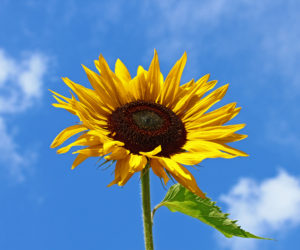Contents
Uses
| The seeds have diuretic and expectorant properties and have been employed with success in the treatment of bronchial, laryngeal and pulmonary affections, coughs and colds, also in whooping cough.
The following preparation is recommended: Boil 2 OZ. of the seeds in 1 quart of water, down to 12 OZ. and then strain. Add 6 OZ. of good Holland gin and 6 OZ. of sugar. Give in doses of 1 to 2 teaspoonsful, three or four times a day. The oil possesses similar properties and may be given in doses of 10 to 15 drops or more, two or three times a day. A tincture of the Howers and leaves has been recommended in combination with balsamics in the treatment of bronchiectasis. The seeds, if browned in the oven and then made into an infusion are admirable for the relief of whooping cough. Tincture of Helianthus has been used in Russia. Kazatchkoft says that in the Caucasus the inhabitants employ the Sunflower in malarial fever. The leaves are spread upon a bed covered with a cloth, moistened with warm milk and then the patient is wrapped up in it. Perspiration is produced and this process is repeated every day until the fever has ceased. A tincture prepared from the seed with rectified spirit of wine is useful for intermittent fevers and ague, instead of quinine. It has been employed thus in Turkey and Persia, where quinine and arsenic have failed, being free from any of the inconveniences which often arise from giving large quantities of the other drugs. The leaves are utilized in herb tobaccos. |
Benefits
- A tea made from the leaves is astringent, diuretic and expectorant, it is used in the treatment of high fevers.
- The crushed leaves are used as a poultice on sores, swellings, snakebites and spider bites. The leaves are harvested as the plant comes into flower and are dried for later use.
- A tea made from the flowers is used in the treatment of malaria and lung ailments. The flowering head and seeds are febrifuge, nutritive and stomachic.
- The seed is also considered to be diuretic and expectorant. It has been used with success in the treatment of many pulmonary complaints.
- A decoction of the roots has been used as a warm wash on rheumatic aches and pains.
Cautions
- The growing plant can accumulate nitrates, especially when fed on artificial fertilizers. The pollen or plant extracts may cause allergic reactions.
Interactions
Unknown, please consult with your doctor.
Other names
sunflower
References
Source: Naturalmedicinalherbs, http://www.naturalmedicinalherbs.net/herbs/h/helianthus-annuus=sunflower.php
Botanical.com, https://www.botanical.com/botanical/mgmh/s/sunfl100.html

